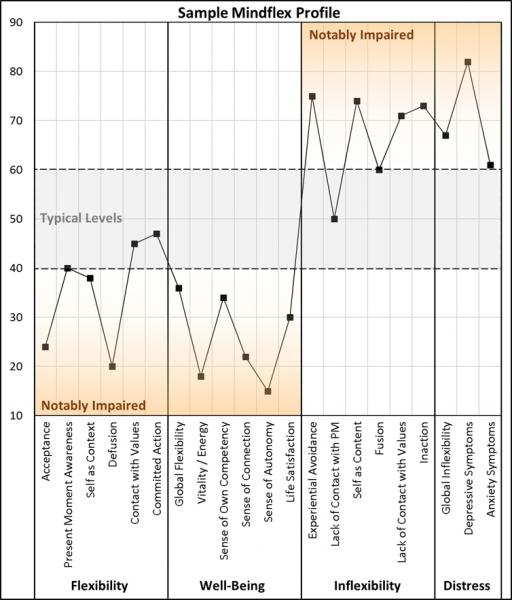GOALS IN DEVELOPING THE MPFI
Dr. Ron Rogge developed the MPFI in collaboration with Dr. Kelly Wilson and Jaci Rolffs. We specifically wanted to create the first scale to comprehensively assess the 6 key dimensions of flexibility and 6 key dimensions of inflexibility from the Hexaflex model.
DEVELOPING THE SCALE
We created an item pool of over 550 items (including 22 of the most widely used scales from the ACT and mindfulness literatures) and gave those items to over 3000 online respondents. We then identified 12 dimensions of flexibility and inflexibility corresponding to the Hexaflex model and selected the 5 most effective items for assessing each dimension with Item Response Theory (IRT) to create the 60-item MPFI.
SCORING
Subscales – To score the MPFI subscales, you assign responses point values from 1 to 6 and then average the responses across the items of each scale so that higher scores reflect higher levels of the dimension being assessed by each set of items.
Global Composites – The averages of the 6 flexibility subscales can be averaged to create a composite representing global flexibility. Similarly, the averages of the 6 inflexibility subscales can be averaged to create a global inflexibility composite.
Shorter Global Composites – The first two items of each of the flexibility subscales can be averaged to create a shorter 12-item global flexibility composite. Similarly, the first 2 items of each of the inflexibility subscales can be averaged to create a shorter 12-item global inflexibility composite.
INTERPRETATION
Normative Information – The research article developing the MPFI (Rolffs, Rogge, & Wilson, 2016; see citation below) presents basic normative data on its subscales (e.g., means and standard deviations by gender). That information will help to place individual scores into a larger context.
Reliable Change – The article also presents Minimal Detectible Change (MDC-95; Stratford, Finch, et al., 1996) estimates for each subscale and for the global composites. These MDC-95 estimates tell researchers and clinicians how many points an individual would need to change on each scale between assessments for that change to be statistically significant. Thus, these MDC95 estimates allow ACT researchers and clinicians to identify clinically significant (i.e., reliable) change groups as suggested by Jacobson and Truax (1991).
Online Interpretative Profiles – The research team is currently piloting an online system (the MindFlex Assessment System - mindflex.org) that not only administers the MPFI (along with some well-validated measures of global functioning) to clients, but also scores the results and provides therapists with standardized flexibility/inflexibility profiles to help inform their work with those clients. In fact, we are currently recruiting therapists for the MindFlex Assessment Project, a research project helping to validate this online service that provides the first ~100 therapists to enroll an opportunity to earn up to $100 for participating (and the first ~300 clients an opportunity to earn up to $80).

CITATION
If you are using this scale, then you should cite the research article validating it as follows:
Rolffs, J. L., Rogge, R. D., & Wilson, K. G. (2016). Disentangling Components of Flexibility via the Hexaflex Model Development and Validation of the Multidimensional Psychological Flexibility Inventory (MPFI). Assessment, 25(4), 458–482. https://doi.org/10.1177/1073191116645905.
Additional Citations:
Lavefjord, A., Sundström, F.T.A., Chia, D., Tabrizi, F., Buhrman, M., & McCracken, L.M. (2025). Comprehensive and Efficient Assessment of Psychological Flexibility in the Context of Chronic Pain. European Journal of Pain, 29, e4781. https://doi.org/10.1002/ejp.4781
Grégoire, S. et al (2020). Validation of the English and French versions of the multidimensional psychological flexibility inventory short form (MPFI-24). Journal of Contextual Behavioral Science, 18, 99-110. https://doi.org/10.1016/j.jcbs.2020.06.004
Barrett, K., O’Connor, M. & McHugh, L. A. (2019). Systematic Review of Values-Based Psychometric Tools Within Acceptance and Commitment Therapy (ACT). The Psychological Record, 69, 457–485. https://doi.org/10.1007/s40732-019-00352-7
